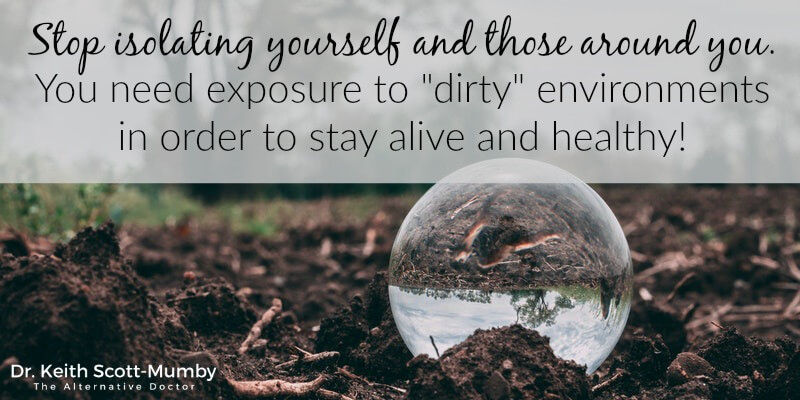I’ve been telling my readers about the “hygiene hypothesis” for years. It’s the obvious fact that we need to encounter pathogens to keep our bodies healthy. If we try and live sterile, it backfires and our immune system goes haywire. Autoimmune diseases are just one possibility. It can even lead to leukemia, as I will explain in a moment.
This will be shocking news to the average (read, silly) American housewife, who thinks it’s her duty to Chlorox every surface continuously, to “protect” her children from “germs”. But of course all that is propaganda and marketing, designed to sell her endless unnecessary—and often quite toxic—cleaning agents.
I explained all this is my tempestuous book Fire In The Belly.
I even reported that deliberately infecting patients with hookworm parasites was working wonders at curing colitis and Crohn’s disease. The improvements were so striking that the patients were asking for extra parasite eggs to continue the treatment, once the scientific trial was ended!
It’s just another version of Nature-knows-best, which I write about all the time. We are designed to continuously evolve and out-manouver parasites. Indeed—fasten your seatbelt and hold on tight—that’s why we have sex! It was invented by Nature for just such a process as outsmarting parasites by living alongside them intelligently.
The idea that if you just KILL EVERYTHING you will be quite safe is not only wrong, it’s dangerously silly. It doesn’t work in war games; it doesn’t work in medicine.
So where is this leading? Well, just to reinforce my message, a UK research team have shown the likelihood that excruciating hygiene cleanliness is a major cause of a particular childhood leukemia: a type of ALL or acute lymphocytic leukemia.
ALL is the most common childhood cancer in developed countries and accounts for about one third of all pediatric malignancies. But why do these cancers develop in young children, and, especially, why they are seen primarily in industrialized societies? Now you know why!
A new review paper1 by noted leukemia researcher Mel Greaves, PhD, FMedSci, FRS, director of the Centre for Evolution and Cancer at the Institute of Cancer Research in London UK, presents strong evidence that the disease is caused through a “two-step process” of genetic mutation interacting with exposure to infection.

It also suggests that in the second stage of the process, a lack of microbial exposure in early life could increase the risk of developing leukemia. “Paradoxically, we think the problem is not infection but a lack of infection early in life,” Greaves is quoted as saying.
The new analysis draws on evidence gleaned from 30 years of research, both from Greaves and other experts across the globe, on the genetics, cell biology, immunology, and epidemiology of childhood leukemia. Based on this evidence, the authors conclude that the cause of ALL is multifactorial, involving both patterns of infection and inherited genetics, as well as other modulators of risk.
It is a “paradox of progress in developed societies” in which there is a mismatch between the evolutionary programming of the immune system and modern lifestyles that limits opportunities for microbial exposure early in life.
This is an important observation, if correct. ALL has been increasing in Europe by around 1% each year. This is part of a 13% global increase in the incidence of childhood cancers, including acute leukemias, as previously reported by Medscape Medical News.2
“What we are reporting is what I hope is a resolution to a 100-year controversy on what causes childhood leukemia,” Greaves said in a video interview released by the ICR. “What we think is the major cause are patterns of infection that are characteristic of developed societies.”
“The immune system has evolved to fight infections, and natural infections in the first few weeks and months of life prime the immune system,” said Greaves. “In the absence of that priming early in life, by natural infections, later immune response are abnormally regulated.”
The risk of developing ALL is also further modified by inherited genetics, chance, and probably diet.
ALL Is a Preventable Disease
“What all this research points to me very powerfully is that ALL is probably a preventable disease,” he said. “So the challenge is how can you possibly do that? We think the way to do this is to give to infants in the first year of life some form of exposure to microbials that’s benign and safe, and I’m reasonably optimistic that in perhaps a 5- to 10-year time frame we’ll see this translated into some real benefit.”
“All of this raises the question as to what parents can do if they are worried about the risk of leukemia,” he said.
“One is not to be overzealous about hygiene and overworried about it,” he said. “Encouraging children to mix with other children and particularly older children would be good, and protracted breastfeeding, for 3 to 6 months would be beneficial.”
The paper was published May 21, 2018 in Nature Reviews Cancer.
The Microbiome
To learn more startling truths about the human microbiome and how we depend utterly on the microbes we share our lives with, read Fire In The Belly.
It’s not just bacteria in the gut, by the way. There are trillions of genes on us and within us, from viruses
Attributions:
The research in Greave’s lab at ICR was largely funded by the charities Bloodwise and The Kay Kendall Leukemia Fund. Greaves has disclosed no relevant financial relationships.
